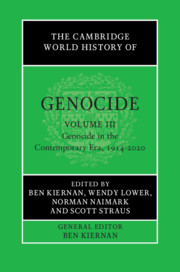Book contents
- The Cambridge World History of Genocide
- The Cambridge World History of Genocide
- The Cambridge World History of Genocide
- Copyright page
- Contents
- Figures
- Tables
- Maps
- Contributors to Volume III
- Introduction to Volume III
- Part I Racism, Total War, Imperial Collapse and Revolution
- Part II World War Two
- Part III The Nation-State System during the Cold War
- 17 Genocide in Latin America, 1950–2000
- 18 China under Mao, 1949–1976
- 19 Half a Century of Genocide and Extermination
- 20 Secession and Genocide in the Republic of Biafra, 1966–1970
- 21 Bangladesh, 1971
- 22 The Genocides in Cambodia, 1975–1979
- 23 The Guatemalan Genocide
- 24 Mass Violence and the Kurds
- 25 Vulnerable Peoples in the Contemporary Era
- Part IV Globalisation and Genocide since the Cold War
- Index
24 - Mass Violence and the Kurds
From the Late Ottoman Empire to ISIS
from Part III - The Nation-State System during the Cold War
Published online by Cambridge University Press: 23 June 2023
- The Cambridge World History of Genocide
- The Cambridge World History of Genocide
- The Cambridge World History of Genocide
- Copyright page
- Contents
- Figures
- Tables
- Maps
- Contributors to Volume III
- Introduction to Volume III
- Part I Racism, Total War, Imperial Collapse and Revolution
- Part II World War Two
- Part III The Nation-State System during the Cold War
- 17 Genocide in Latin America, 1950–2000
- 18 China under Mao, 1949–1976
- 19 Half a Century of Genocide and Extermination
- 20 Secession and Genocide in the Republic of Biafra, 1966–1970
- 21 Bangladesh, 1971
- 22 The Genocides in Cambodia, 1975–1979
- 23 The Guatemalan Genocide
- 24 Mass Violence and the Kurds
- 25 Vulnerable Peoples in the Contemporary Era
- Part IV Globalisation and Genocide since the Cold War
- Index
Summary
Kurds are a diverse ethnic group who number 30 to 40 million, and speak languages of the Indo-European family. A majority of Kurds are Sunni Muslims, but minorities follow Shi’ism, Alevism, Yarsanism, Yazidism, Zoroastrianism and Christianity. They are culturally distinct from Arabs, Turks, Persians, Syriacs and Armenians, their historical neighbours. The Kurds’ experience with modern mass violence, from civil wars to genocides, is long and complex. Whereas Kurds lived for centuries in pre-national conditions in the Ottoman and Persian empires, the advent of nationalism and the nation-state system in the Middle East in the twentieth century radically changed their situation.
- Type
- Chapter
- Information
- The Cambridge World History of Genocide , pp. 574 - 598Publisher: Cambridge University PressPrint publication year: 2023

